Thailand plans to seek talks with the United States on a decision to end preferential trade privileges on a range of Thai exports including seafood, officials said Monday.
Keerati Rushchano, acting director-general of the Commerce Ministry’s Foreign Trade Department, said his office has been warning exporters that the U.S. might withdraw the duty-free status for some products and had been advised by the U.S. to expect it.
The Office of the United States Trade Representative announced Friday it was suspending $1.3 billion in trade preferences for Thailand under the Generalized System of Preferences, or GSP, because of its failure to adequately protect worker rights.
Keerati said Thailand will try to negotiate the issue before it takes effect in April, as did Thai Prime Minister Prayut Chan-o-cha in separate remarks Monday. The U.S. Trade Representative’s announcement said the GSP eligibility was open to periodic review.
Thailand has faced complaints for years over labor issues, particularly in its fisheries industry.
“Despite six years of engagement, Thailand has yet to take steps to provide internationally recognized worker rights in a number of important areas identified in a 2015 petition from the American Federation of Labor and Congress of Industrial Organizations (AFL-CIO), such as providing protections for freedom of association and collective bargaining,” said the U.S. announcement.
It said the list of products to be excluded from GSP focused on those “for which the United States is a relatively important market for Thailand, but where Thailand accounts for a relatively small share of U.S. imports” and “due to longstanding worker rights issues in the seafood and shipping industries, GSP eligibility will be revoked for all seafood products from Thailand.”
The U.S. move drew special attention because it came shortly after Thailand announced a ban on the herbicide glyphosate, which is sold under the brand name Roundup by Monsanto, a U.S. subsidiary of German pharmaceutical giant Bayer.
Leaked letters to the Thai government from the U.S. Department of Agriculture and its representative at the U.S. Embassy urged a delay on the ban, saying the health hazards of the farming chemical had been exaggerated and the ban could affect the export of certain farm products from the US to Thailand.
The documents, whose provenance was not denied by the U.S. Embassy, were leaked just ahead of the U.S. announcement on GSP, fueling suspicion that the trade representative’s actions was retaliation. The suspicions were highlighted on Thai nationalist accounts on social media.
However, Thai and U.S. officials both denied any connection.
A statement from the U.S. Embassy, addressing concerns that reasons besides labor rights were behind the GSP move, noted that the GSP review of worker rights had been under way for six years.”
“Despite the six years of engagement, Thailand has yet to take steps to afford internationally recognized worker rights in a number of important areas identified in a 2013 petition from the AFL-CIO, such as providing protections for freedom of association and collective bargaining,” it said.
It expressed hope “that in announcing this action, we will incentivise Thailand to move forward with legislation and administrative enforcement actions related to worker rights that could lead to a reversal of the GSP action.”
As reported by The Associated Press.

































